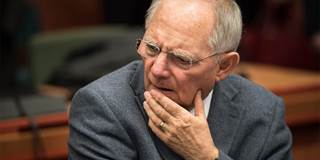Germany’s Power Problem
From think tanks and NGOs to media and business lobbying, Germans have become the EU’s foremost movers and shakers, and occupy its political institutions’ top posts. But, though indisputably the strongest and most dependable of the EU’s 28 member countries, Germany lacks a vision of where the beleaguered bloc should be heading.

BRUSSELS – It is a short tram ride from the massive building that houses the European Union’s Council of Ministers to the Brussels office of the German think tank Stiftung Wissenschaft und Politik (SWP). On a recent morning, both provided equally revealing illustrations of Germany’s growing political clout in Europe.